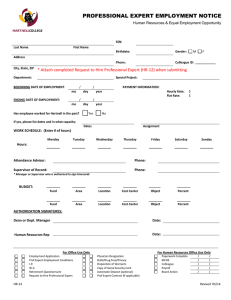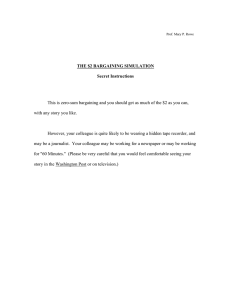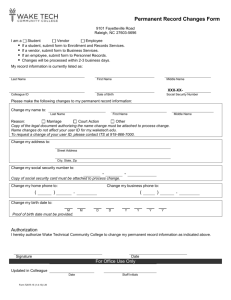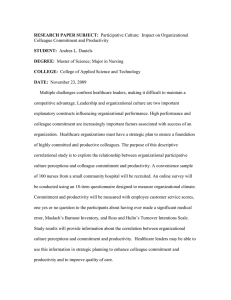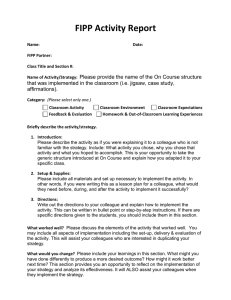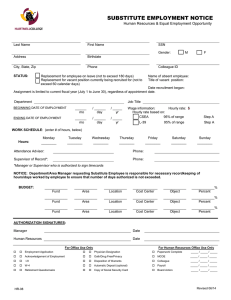Trinity College Dublin School of Linguistic, Speech and Communication Sciences
advertisement
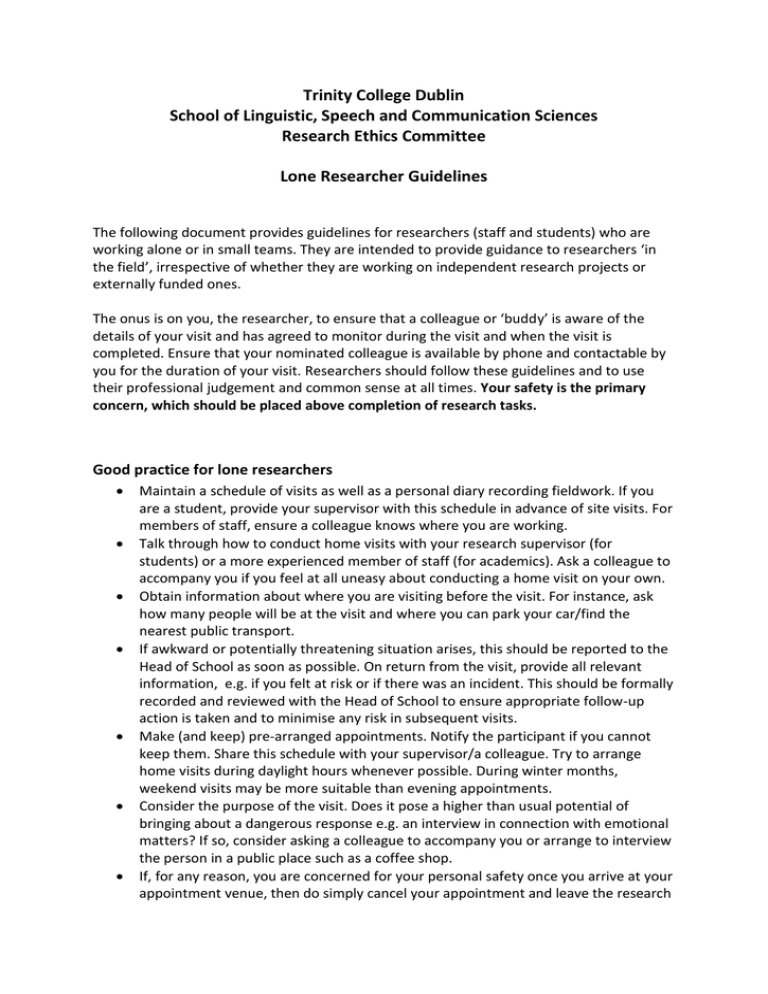
Trinity College Dublin School of Linguistic, Speech and Communication Sciences Research Ethics Committee Lone Researcher Guidelines The following document provides guidelines for researchers (staff and students) who are working alone or in small teams. They are intended to provide guidance to researchers ‘in the field’, irrespective of whether they are working on independent research projects or externally funded ones. The onus is on you, the researcher, to ensure that a colleague or ‘buddy’ is aware of the details of your visit and has agreed to monitor during the visit and when the visit is completed. Ensure that your nominated colleague is available by phone and contactable by you for the duration of your visit. Researchers should follow these guidelines and to use their professional judgement and common sense at all times. Your safety is the primary concern, which should be placed above completion of research tasks. Good practice for lone researchers Maintain a schedule of visits as well as a personal diary recording fieldwork. If you are a student, provide your supervisor with this schedule in advance of site visits. For members of staff, ensure a colleague knows where you are working. Talk through how to conduct home visits with your research supervisor (for students) or a more experienced member of staff (for academics). Ask a colleague to accompany you if you feel at all uneasy about conducting a home visit on your own. Obtain information about where you are visiting before the visit. For instance, ask how many people will be at the visit and where you can park your car/find the nearest public transport. If awkward or potentially threatening situation arises, this should be reported to the Head of School as soon as possible. On return from the visit, provide all relevant information, e.g. if you felt at risk or if there was an incident. This should be formally recorded and reviewed with the Head of School to ensure appropriate follow-up action is taken and to minimise any risk in subsequent visits. Make (and keep) pre‐arranged appointments. Notify the participant if you cannot keep them. Share this schedule with your supervisor/a colleague. Try to arrange home visits during daylight hours whenever possible. During winter months, weekend visits may be more suitable than evening appointments. Consider the purpose of the visit. Does it pose a higher than usual potential of bringing about a dangerous response e.g. an interview in connection with emotional matters? If so, consider asking a colleague to accompany you or arrange to interview the person in a public place such as a coffee shop. If, for any reason, you are concerned for your personal safety once you arrive at your appointment venue, then do simply cancel your appointment and leave the research site. On return to the office, make alternative arrangements – for instance having a member of staff experienced in working on their own accompany you. General guidelines Ensure that you have your mobile phone with you at all times. Make sure it is fully charged when you are doing fieldwork, bring a charger with you. Save the relevant security and emergency numbers (e.g. campus security, 01 896 1999) in your phone. Alert a named colleague or ‘buddy’ when your work involves you working alone, in vulnerable situations or undertaking home visits, so that an effective process is put in place to ensure your safety. When conducting research away from the university, carry your university identity card (with photograph). Ensure you have a map of the area you are working in, plan your route in advance. Consider carrying a personal alarm (to be kept in an accessible place) to attract attention in an emergency Reduce the number of money and valuables you carry, avoid wearing expensive jewellery or watches. If an item is grabbed – let go of it! Avoid travelling by foot if feeling vulnerable. Use public transport, private car or travel by registered taxi In multi-storey buildings, think about safety when choosing lifts or staircases. Let research participants interviewee know that you have a schedule and that others know where you are. This may involve arranging for a colleague or taxi to collect you, or arranging for someone to call you at a designated time. Leave your mobile phone switched, on even during interviews Assess the layout and the quickest way out of a research site. If interviewing in a private dwelling, stay in the communal rooms. When using your own car for travel With your nominated colleague/buddy, share the make, model, colour and registration of the car you will be driving and the route you will be taking. Ensure you have adequate breakdown service. Ensure that car users have the appropriate level of insurance cover. Drivers should travel with doors locked and windows closed. If windows are open, handbags and briefcases should be kept out of sight. At night, the car should be parked in a well-lit and busy place. Multi‐storey parks, or car parks where the car and the user will not be easily visible, should be avoided. If a driver thinks they are being followed, they should keep driving until they reach a busy area ‐ Garda station or a garage, etc. Staff should avoid taking research participants as passengers. During a home visit Your safety is the primary concern, which should be placed above completion of research tasks. Do not enter someone’s home if you don’t feel comfortable or safe. If you feel uncomfortable while in a person’s home, you should take steps to leave immediately. Do not enter a house if the person you have arranged to see is not there. Be aware of, and maintain, personal safety at all times during visits. Always explain your research role clearly and the conditions of confidentiality. If the participant is anxious, consider encouraging them to have a carer/friend within sight/hearing. When visiting people’s homes, try to let them lead the way. Avoid being the first to go into any room. Be extra careful when alone with participants e.g. fetching something from a handbag, comforting participants. You should always make sure that the exit from the room is clear. If you are in any doubt about the behaviour of animals in the home, ask for it/them to be locked away while you are visiting. Never undertake an interview or assessment in the bedroom. Do not give your personal telephone number or address to clients. You should not interview anyone who is under the influence of alcohol or drugs. A professional and friendly attitude should be adopted but over-familiarity must be avoided. Remember that the interviewee may also feel anxious about the interview and your visit. You should bear this in mind whilst also ensuring your own safety. Be alert for signs of threatening behaviour and danger, e.g. raised voice, rapid speech and babbling indicate rising tension; Changes in voice or body language as the conversation progresses may suggest anger, frustration or impending violent behaviour, e.g. flushed face, fidgeting, pointing, folded arms. Keep your distance. Each of us has a personal space, which we defend when we feel it is being invaded.
